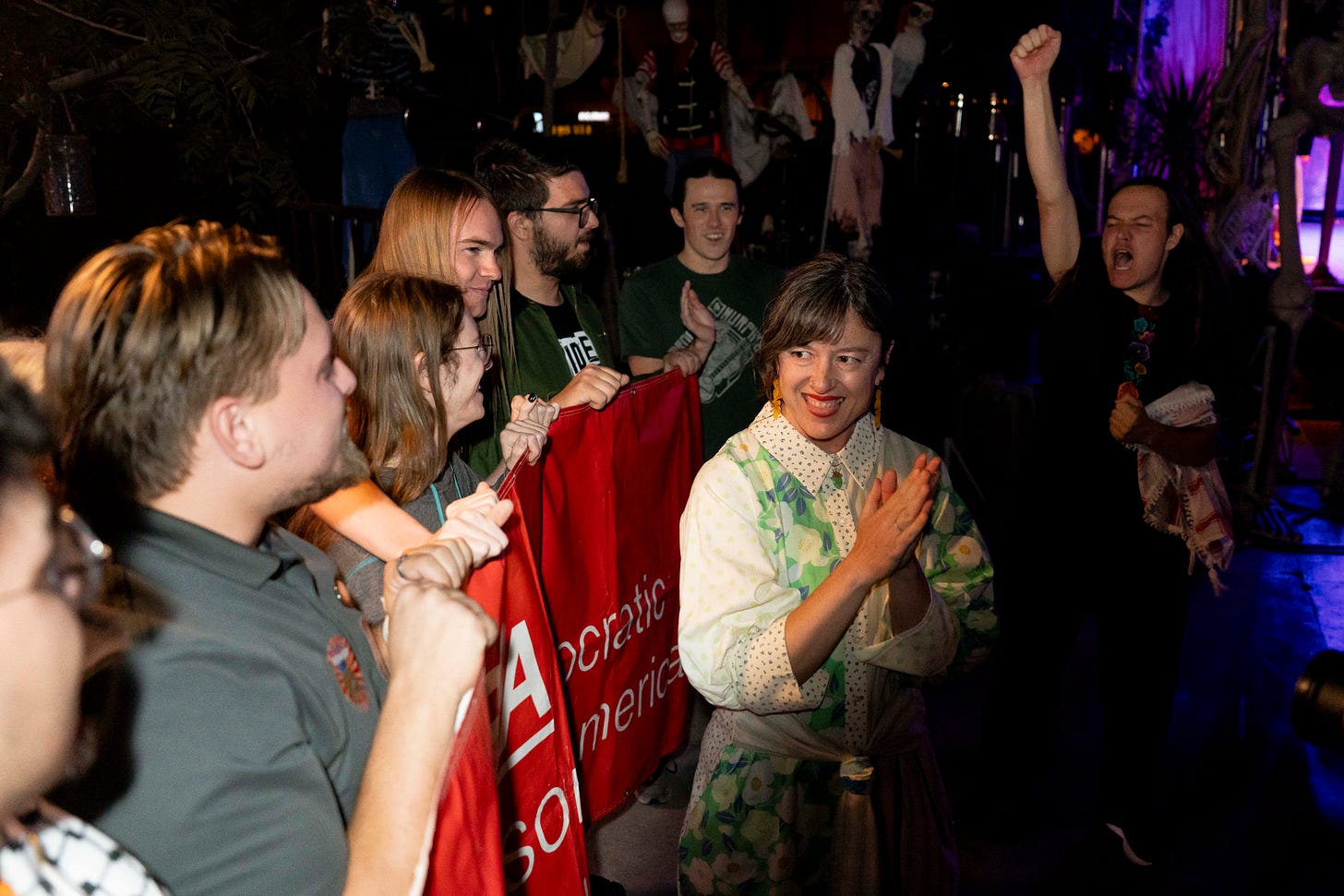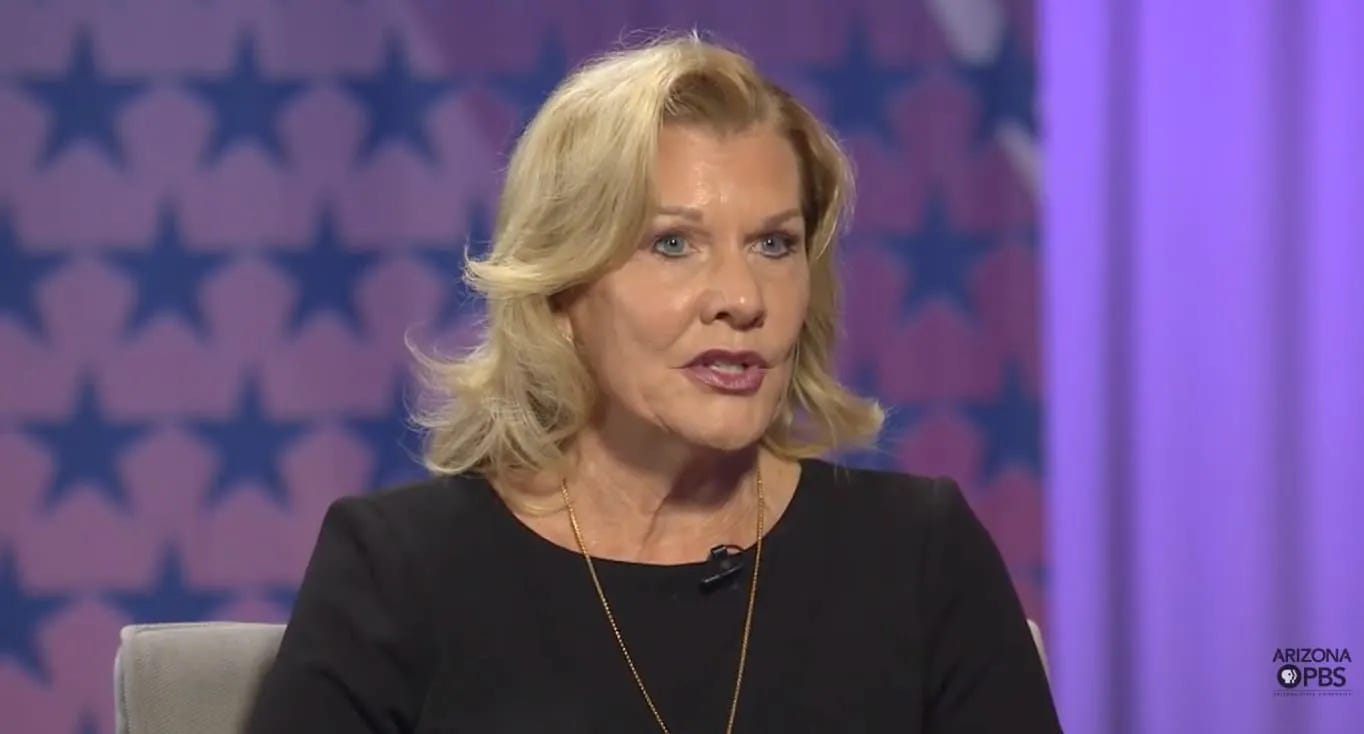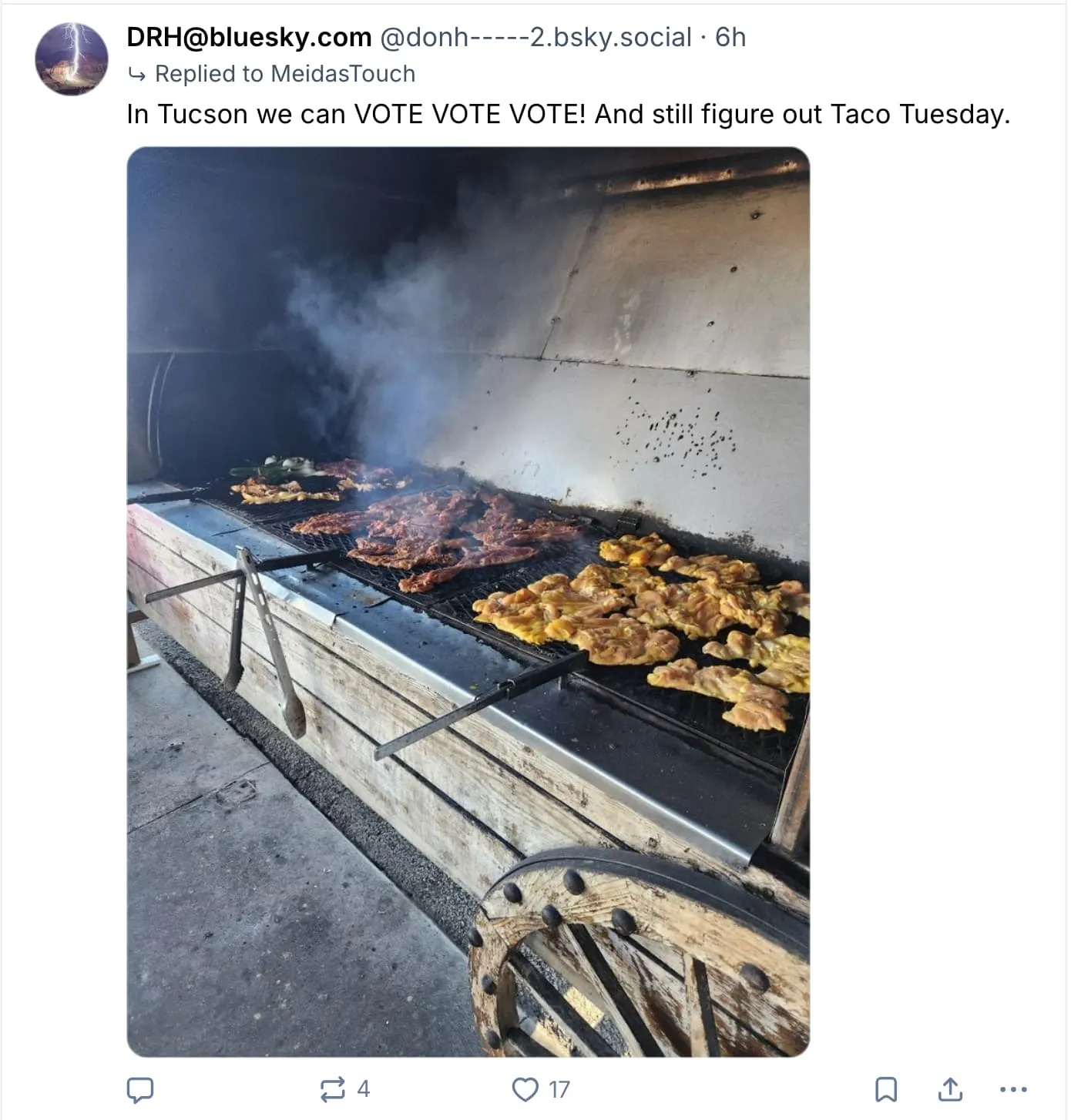New faces, familiar blue hue
Another all-Dem city council … No observers for this election … And Rio sounds nice this time of year.
Yesterday’s Tucson City Council election ended just as it has for the last 16 years of general elections — every Democrat on the ballot won their race.
All seven members of the council will once again be Democrats — until at least the next election cycle in two years.
At least one new member — Miranda Schubert, who will represent central Tucson’s Ward 6 — also identifies as a socialist.1
Voters also elected Democrat Selina Barajas to represent the south side’s Ward 5, and gave Kevin Dahl a second term representing northwest Tucson’s Ward 3.
While Schubert is just one vote among seven, the election results suggest that the incoming council could be more liberal than its current iteration.2
You can see all of Pima County’s election results here.

So what could 2026 look like?
Take, for example, the multi-million-dollar fight over keeping buses free next year.
During the budget hearings, Schubert is expected to vocally push to extend the program despite significant budget hurdles ahead for the city.
At last count, the projected deficit for the next fiscal cycle is roughly $70 million — although the city is looking at a “fiscal diet” to reduce costs, which could shrink that number to as low as $40 million.
But after last night’s election, fares collected from riders are unlikely to be part of that solution.
The three new and returning progressive members are unlikely to back efforts by Councilmember Nikki Lee, who said in her newsletter two weeks ago that the fiscal reality is the city can’t afford to spend $70 million on public transit without some kind of revenue to offset expenses.
Another example is the ordinance banning camping in washes that passed this summer in an effort to stave off new lawsuits against the city tied to the voter-approved Proposition 312. The new proposition requires municipalities to reimburse property owners for losses they claim resulted from unenforced public nuisance laws — such as rules banning panhandling, illegal camping, and public urination.
The vote this summer was deadlocked 3–3, with then-Councilmember Richard Fimbres unable to vote due to an audio issue. The council passed the controversial ordinance after his successor, Rocque Perez, was sworn in.
It is unclear whether there are enough votes to back similar ordinances in the future, but there are good reasons to believe the council will have to consider more ordinances related to Prop 312.
Tucson has a plan
City voters also overwhelmingly approved Plan Tucson 2025 — also known as Proposition 417 — which will serve as the primary planning document for the City of Tucson for the next decade.
The plan serves as the guiding document for efforts to develop more affordable housing, increase climate resilience, update long-range public transit planning, and reduce poverty.
But as we noted last week, Plan Tucson is tied to dozens of other planning documents that are signed off on by the council, as well as neighborhood groups.
School bonds
Voters also opened their wallets to back public education measures on the ballot Tuesday night.
All three school bonds and overrides in Pima County passed.
For the Tucson Unified School District, voters approved the first maintenance and operations (M&O) override for Southern Arizona’s largest school district in more than 25 years. By approving Proposition 414, the district is expected to give teachers and staff raises, and to expand career and technical programs like automotive technology, welding, construction, HVAC and culinary arts.
Southside voters also approved a $120 million bond for the Sunnyside Unified School District to repair its aging campuses.
The governing board has set aside $58 million of the bond just for the Sunnyside High School campus.
The bulk of the bond will go toward repairing aging infrastructure throughout the district — replacing plumbing, HVAC, and other systems before they outright fail.
In the Flowing Wells School District, voters approved a $30 million modernization bond known as Proposition 415.
The measure is the culmination of about 120 projects designed to improve security, expand early childhood education, and update core infrastructure.
The school board will also expand its successful early childhood program to the northern portion of the district as part of the voter-approved measure.
How do you observe a mail-in ballot election?
Over the course of the last 24 hours, we’ve learn that it might be best described as a Facebook relationship status: “It’s complicated.”
No one from either the Pima County Republican or Democratic Party sent observers to yesterday’s mail-in election, although there is a process in place to do so.
The Pima County Republican Party had asked for observers well before Election Day, but that request was sent to the Pima County Elections Department, not Pima County Recorder Gabriella Cázares-Kelly.
It is unclear why that message wasn’t forwarded to Cázares-Kelly, but observers from the GOP were turned away from “ballot replacement centers” — which can also be called vote centers. Semantics aside, local Republicans were unhappy.
Pima County Republican Chair Kathleen Winn sent a letter to Cázares-Kelly on Tuesday afternoon asking for legal clarification, as well as “immediate corrective steps your office will take to ensure lawful access for credentialed observers from all recognized parties.”
Winn said on Tuesday night she did not get a formal response.
She said she has had a good relationship working with the elections department and was surprised when she got calls about volunteers being turned away from the ballot replacement centers.
“I am really disappointed,” Winn said.
The local Republican Party worked hard to find volunteers who’d be willing to come out on Election Day, she said.
Local Democrats did not send observers, party officials confirmed to the Tucson Agenda.
A spokesperson for the Recorder’s Office said their procedures have been in place since 2024 and both parties are welcome to send observers as long as they follow the guidelines, which prioritize processing ballots on Election Day.
“The Recorder still welcomes political party observers at the Ballot Processing Center, with prior notification from the political party chair. We encourage all who wish to observe, learn and monitor our procedures to apply to work as an election aide,” spokesman Michael Truelsen said.
The last part might be more important than you think. The recorder’s office has long struggled with staffing, and currently has a 23% vacancy rate.
As of Tuesday night, it was unclear what steps Republicans might take next — but at the very least, they’ll be sending more emails to Cázares-Kelly rather than the elections department.
No government, no groceries: Southern Arizona mutual aid groups and food banks are seeing increased demand, especially in rural areas where food insecurity predates the federal SNAP rollbacks, the Arizona Luminaria reports. Meanwhile, a Tucson church asked the Star to remove it from its list of food resources across Pima County because of overwhelming demand, Sierra Blaser writes. Further adding to the uncertainty, after the Trump administration told a federal judge on Monday that it would pay half of the costs of SNAP benefits for November, Trump followed up yesterday, saying he’s not releasing any funds until “the Radical Left Democrats open up government.”
The relief crew: The Tohono O’odham Nation will start distributing food tomorrow for tribal members impacted by the SNAP cuts, the Tucson Sentinel’s Paul Ingram writes. Tucson Electric Power said it will donate $50,000 to the Community Food Bank of Southern Arizona, per KGUN9. And Tucson Water announced it won’t cut off residential water services during the government shutdown, per Ingram. The Pima County Board of Supervisors also voted to provide interim funding of $399,440 for the county’s Women, Infants and Children (WIC) Program.
A wake-up call: Tucson is working on safety upgrades to the busy intersection of North Euclid Avenue and East Second Street, where three University of Arizona students were killed in a hit-and-run crash last week, the Star’s Charles Borla reports. The city says it has been working on upgrades at the intersection since 2023 and plans to install a TOUCAN light that signals that both cyclists and pedestrians can cross.3
Phew: San Luis’s mayor and city council members will continue receiving a salary after voters rejected Prop 434, which would have eliminated their pay, trip allowances and benefits. Council members previously denied the proposal twice before the public vote, but San Luis Mayor Nieves Riedel supported slashing salaries to fund parks and rec programs instead, per KYMA’s Abraham Retana.
Our salaries are pretty much up for a vote every day. Cast your vote with the subscribe button.
Nuevo Rio: Tucson Mayor Regina Romero didn’t make it to the election night parties in Tucson last night, nor will she be presiding over today’s Tucson City Council meeting. Instead, the two-term Democrat is in Rio de Janeiro for the C40 World Mayors Summit 2025. The conference is focused on solutions to the growing climate crisis. City officials said the trip was paid for by sponsors of the conference, including Bloomberg Philanthropies, Novo Nordisk, Carrier (a commercial HVAC company), GIZ Brazil and Uber.
If you’ve ever doubted that a rift is widening between the Tucson City Council and the Pima County Board of Supervisors, go read Supervisor Rex Scott’s 1,580-word screed — which he delivered, out loud, during Tuesday’s board meeting.
For months, the county has been on the receiving end of pointed criticism from Tucson Mayor Regina Romero, who says the city is facing a “public health crisis” driven by fentanyl and other narcotics used by people living on the streets. She and other members of the council implied that Pima County should be doing more to help solve that issue.
Scott fired back, arguing that the county has long worked alongside the city on fentanyl, homelessness and other regional crises — and that it’s the city, not the county, picking this fight.
“We look forward to continuing our partnership with the City of Tucson in these endeavors, but collaboration will be hindered if city leaders persist in making baseless charges about our track record and level of commitment,” Scott said, wrapping up his speech.
The first joint meeting between the two governments is now set — and if this is the preview, it’s going to be epic.
Bring popcorn.
We will remind you that another self-identified socialist, Tucson Unified School District Governing Board member Sadie Shaw, lost the Democratic primary in Ward 3 by 19 votes.
Fun fact: The next council will have the largest number of women on it in recent memory — five women and two men.
TOUCAN is a clever wordplay on the idea that “Two Can” cross at the same time, as opposed to the other bird-themed crossing, a HAWK (High-intensity Activated crossWalK), which is a traffic signal used at marked crosswalks where a full signal isn’t warranted but visibility for pedestrians is poor.







Joe, why would any SANE/PATRIOTIC Tucson citizen vote for any Trump sycophant? I very much like Tucson being a blue town! Now, the challenge is to rid us of a chickenshit MAGA Congressman who has never held a town hall in Tucson since he gained that office on 01-03-2021!!!
I actually identify as a Democratic Socialist!